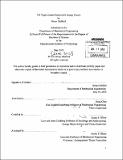US Virgin Islands renewable energy future
Author(s)
Oldfield, Brian (Brian K.)
DownloadFull printable version (3.743Mb)
Other Contributors
Massachusetts Institute of Technology. Department of Mechanical Engineering.
Advisor
Gang Chen and Susan S. Silbey.
Terms of use
Metadata
Show full item recordAbstract
The US Virgin Islands must face drastic changes to its electrical system. There are two problems with electricity production in the USVI-it's dirty and it's expensive. Nearly one hundred percent of the electricity in these islands comes from imported diesel, brought in by ship. Expensive fuel and inefficient power generation facilities have caused residential electricity rates to soar to $0.58 per kWh-five times the national average.' These electricity prices are causing businesses to close their doors and residents to camp in the dark in their own homes because they are unable to pay the bills. This must change. Electricity prices must come down, else risk political and economic disaster. The thesis proposes a set of policies to help USVI get cleaner as its energy gets cheaper. Nearly year-round, the Caribbean sun shines and the Trade Winds blow, yet both are virtually unused. The USVI is in a position to be a world leader in clean energy. The USVI government has demonstrated its commitment to this role as a clean energy leader. In 2009, Governor John P. DeJongh passed Act 7075, creating an ambitious renewable energy standard. By 2025, the USVI will reduce fossil fuel use by 60 percent. Having committed itself, the USVI must determine how it may meet this goal. In this paper, I analyze the issues and propose specific paths towards the USVI clean energy future.
Description
Thesis (S.B.)--Massachusetts Institute of Technology, Department of Mechanical Engineering, 2013. Cataloged from PDF version of thesis. Includes bibliographical references (pages 37-38).
Date issued
2013Department
Massachusetts Institute of Technology. Department of Mechanical EngineeringPublisher
Massachusetts Institute of Technology
Keywords
Mechanical Engineering.